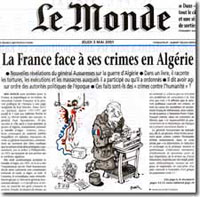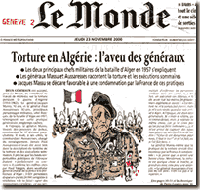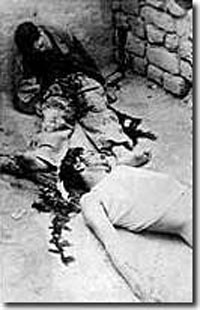The debates about the U.S. use of torture in its ongoing military campaigns against the people of the Middle East often ring hollow. Listening to many of the impassioned legal and moralistic arguments against the practice, one is reminded of General Paul Aussaresses‘s observation: “Only too often today condemning others means acquiring a certificate of morality for just about anyone.” He was talking about those who criticized his role in the French war against Algeria in the 1950s, but his observation is germane to the issue of torture today.

|
After 40 years of silence, Aussaresses decided to tell the truth about torture from a military point of view in his book, The Battle of the Casbah: Terrorism and Counter-Terrorism in Algeria, 1955-1957 (New York: Enigma Books, 2002). His admission of torture and summary executions caused a furor in France and resulted in a civil lawsuit against him, his publisher, and his editor by several human rights organizations. The charge was “justifying war crimes.” Aussaresses, along with his co-defendants, was found guilty and fined in 2002. They have all subsequently appealed the conviction.
Aussaresses’s narrative of the campaign of torture and death against the Algerian insurgency is specific and succinct:
While torture was widely used in Algeria, it didn’t mean that it was an ordinary occurrence. We didn’t discuss it among officers and an interrogation didn’t necessarily end up in torture. Some prisoners started talking very easily. Others only needed some roughing up. It was only when a prisoner refused to talk or denied the obvious that torture was used. We did everything we possibly could to avoid having the youngest soldiers bloody their hands and many would have been unable to see it through anyway. The methods I used were always the same: beatings, electric shocks, and, in particular, water torture, which was the most dangerous technique for the prisoner.
The torture worked more often than not: “It never lasted for more than one hour and the suspects would speak in hope of saving their own lives. They would therefore either talk quickly or never.” In the same vein, Aussaresses relates several summary executions.
French paratroopers used the information that they gained through torture to capture or kill members of the insurgency. The whole story is documented in the film classic, The Battle of Algiers.
Ultimately, General Aussaresses remains unapologetic for his role in the conflict:
What I did in Algeria was undertaken for my country in good faith, even though I didn’t enjoy it. One must never regret anything accomplished in the line of a duty one believes in. . . . I write only about myself in my memoir. I don’t attempt to justify my actions, but only to explain that once a country demands that its army fight an enemy who is using terror to compel an indifferent population to join its ranks and provoke a repression that will in turn outrage international public opinion, it becomes impossible for that army to avoid using extreme measures.
Aussaresses’s basic truth is ugly: torture works, so soldiers, given their duty, use it without mercy or regrets. But, Aussaresses also exposes a larger political truth: a country that invades another and demands the pacification of resistance to the invasion has committed itself to extreme measures that will inevitably become necessary to suppress the resistance.
In the final analysis, however, Aussaresses’s truth about torture fails the test of history. While it is true that the ruthless French paratroopers won the Battle of Algiers, France ultimately lost the war for Algeria. Though the practice of torture was tactically useful, it proved to be strategically counterproductive. This, too, is documented in The Battle of Algiers. Although the film was shown to a group of military and civilian “experts” in the Pentagon in 2003, no one seems to have heeded its message (see Louis Proyect, “Looking Back at The Battle of Algiers,” MRZine, 12 Aug 2005).
The use of torture is an inescapable byproduct of war of conquest, the truth ignored by not only conservatives who justify it but also liberals who abhor it and yet refuse to end the U.S. wars in Iraq, Afghanistan, and elsewhere. As long as the U.S. wars against the people of the Middle East, in both their overt and covert manifestations, continue, torture will never cease.
Richard D. Vogel is an independent socialist writer. He has recently completed a book, Stolen Birthright: The U.S. Conquest and Exploitation of the Mexican People.



